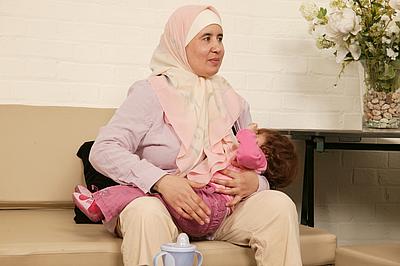Infant Feeding Part 1: Breastfeeding course


This session aims to provide you with the necessary information to help you enable women to initiate and continue breastfeeding for as long they choose to.
Learning Objectives
By the end of this session you will be able to:
- List the main health outcomes related to breastfeeding/breastmilk feeding vs. formula feeding for mothers and infants
- Outline current recommendations for infant feeding, including vitamin supplementation
- Explain the physiology of breastfeeding and how to support mothers in establishing breastfeeding
This session will give you the information you need to enable women to initiate and continue breastfeeding for as long they choose to.
Mary qualified as a nurse in 1977 (University of Edinburgh), and as a midwife (Edinburgh) in 1978. She was awarded a PhD in 1982, having spent several years with the MRC Reproductive Biology Unit, conducting clinical research in breastfeeding.
Mary worked as a midwife in Oxford and spent several years teaching in Alberta, Canada before taking up post as Director of the Midwifery Research Initiative at the National Perinatal Epidemiology Unit in Oxford (1988).
She was appointed as Professor of Midwifery Studies in the University of Leeds (1994), before taking up her current post as Professor of Mother and Infant Health in the University of York (2004).
She established and currently directs the multidisciplinary Mother and Infant Research Unit, where she leads a programme of work on maternal and infant nutrition, including research and evidence-based policy and practice.
Mary has conducted research and systematic reviews on infant feeding for NICE, the NIHR Health Technology Assessment programme, the Cochrane Collaboration, and the Department of Health.


Following qualification as a midwife in Bristol in 1981, Alison experienced all aspects of clinical midwifery working in Bristol and Middlesbrough in the UK.
She spent three years working as a volunteer in Malawi, Central Africa, in the role of midwife-in-charge and midwifery tutor at a small rural mission hospital. Alison qualified as a midwife teacher at the University of Nottingham and was a midwifery lecturer at the University of Teesside until 2006.
Alison gained an MA in Applied Educational Studies at the University of York in 1993. In 2005 she was seconded to the Mother and Infant Research Unit at the University of York. In 2006, she was awarded a National Institute of Health Research Doctoral Fellowhship. Her doctoral research explored the breastfeeding experiences and support needs of women of Bangladeshi origin living in the UK.
Alison is currently employed as a research fellow at the Mother and Infant Research Unit.
- Enabling People to Live Well with Dementia | Perso...
- Posted By eIntegrity Healthcare e-Learning
- Posted Date: 2025-01-06
- Location:Online
- This session will help you to understand that person-centred dementia care involves: Respectin...
- Heart Failure and Heart Valve Disease | Transformi...
- Posted By eIntegrity Healthcare e-Learning
- Posted Date: 2025-01-06
- Location:Online
- This session discusses transforming heart failure care across your Primary Care Network.​
- Heart Failure and Heart Valve Disease | Secondary ...
- Posted By eIntegrity Healthcare e-Learning
- Posted Date: 2025-01-06
- Location:Online
- This session discusses the management of heart failure in secondary care in the UK.
- Heart Failure and Heart Valve Disease | Management...
- Posted By eIntegrity Healthcare e-Learning
- Posted Date: 2025-01-06
- Location:Online
- This session provides a guide to the management of heart failure in the community, focusing on proactively managing symptoms to prevent disease progression, repeated admission to hospital and educating patients to monitor and self manage their condition,
- Heart Failure and Heart Valve Disease | How to Opt...
- Posted By eIntegrity Healthcare e-Learning
- Posted Date: 2025-01-06
- Location:Online
- This session looks at how to optimise management of heart failure in primary care and offers practical evidence-based approaches to managing patients that have heart failure with a reduced ejection fraction (HFrEF).








